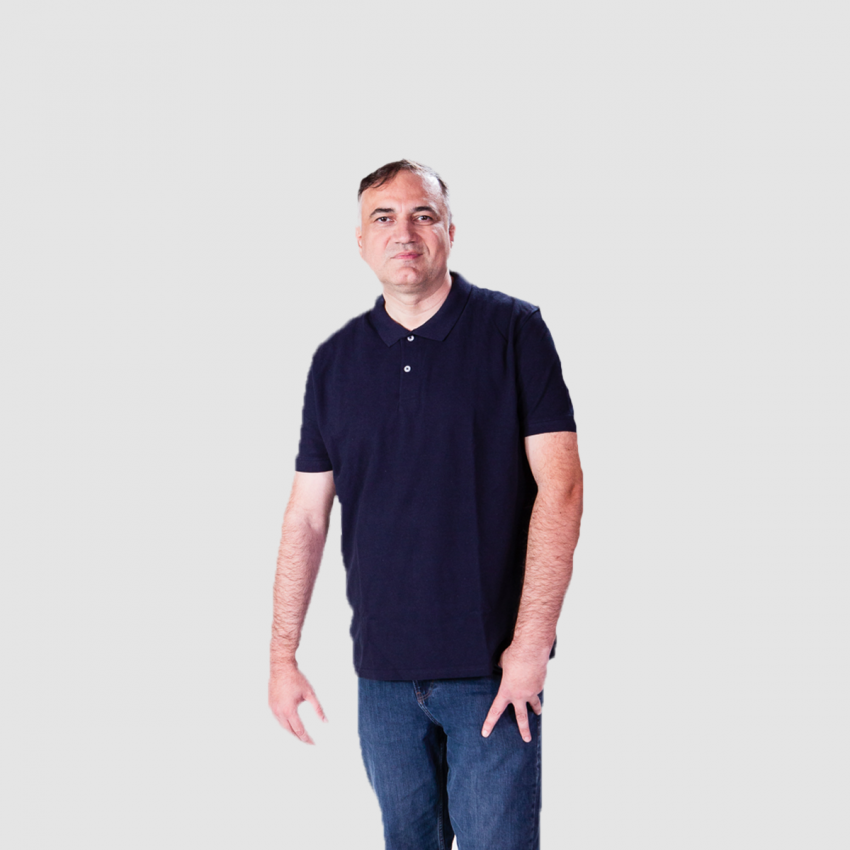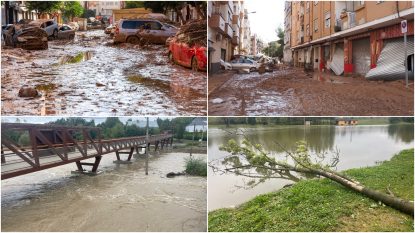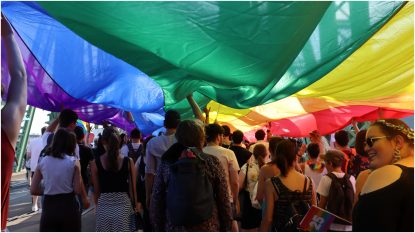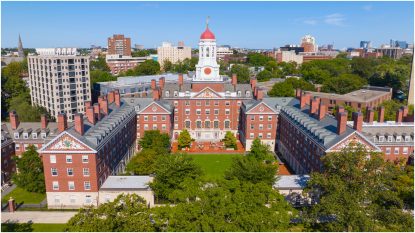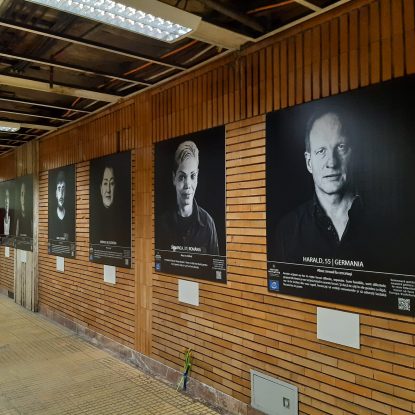
Voice in speaker, subway station background: “The permanent conditioning of access to resources imposed by the Ceaușescu family led to abuses that resulted in tens of thousands of victims …”
Voice Over: On a Wednesday, on the subway, there is talk about communism. On the wall of the station???), 60 large photographs one metre by one metre in size were hung, telling stories of the abuses…
Reporter: What do you think of this exhibition?
Visitor: Interesting. but I almost can’t believe it.
Voice Over: Says a man carrying a bicycle on the subway. He’s among the few visitors of the exhibition at this time.
Visitor: Nothing but abuse, abuse, abuse, to people who suffered in their childhood. It is something very serious.
Voice Over: From each photo a man or a woman is looking at you, with a story that is summed up in a few lines.
Andreea, abused victim: Here, on the subway, I have a photo. A big photo underneath that says abuse in a placement centre. I want the authorities in charge of the system to take a closer look at our problems.
Vasile, abused victim: Vasile, 41, Romania. I wish children in institutions would really get involved. More money for their problems.
Sârmanca, abused victim: Serbian, 37. Romania!!! (Laughs)
Voice Over: These are just a few examples of Romanians’ stories told by the photos on the metro.
Reporter: Have you ever had a photo that big?
Sârmanca: No …
Reporter: It’s bigger than you.
Sârmanca: Yeah. And you can tell I’m stronger there than I am now.
Reporter: What’s your story?
Sârmanca, abused victim: Stop the abuses, let the world make the promised changes. Because they keep promising, but do nothing. I want to see action.
Reporter: It says abuse at the dormitory. Which hostel did you go to?
Sârmanca, abused victim: I stayed at the Cighid hospital. From 3 to 16 years old. People say there was no abuse there. But we were tormented. We had no electricity, no water and good food. They washed us with a cold water hose. There were also rats. We were naked, unwashed… with urine on us. It was a trauma there… I don’t sleep nights without light. I’m very afraid of the dark. If the lights go out now, I either run or jump. And all I hear is screaming, crying. Darkness frightens me.
Reporter: You have a picture here on the subway. How is it?
Andreea, abused victim: It is not that simple. My friends told me people would say I was a victim. But I know I’m a survivor. And it’s imperative that we talk about what’s going on in the protection system
Reporter: What’s your story?
Andreea, abused victim: I was abandoned. I grew up in a foster home until I was 7 years old, then I went back to my family for 7 years, followed by another 7 years living in an orphanage. And now I am out of the system.
Reporter: Under your photo it says: Abuse in the family and in the center. Where was it worse?
Andreea, abused victim: In the orphanage. I was frustrated that my mother left me, that it was a new environment; I didn’t like the people there. That’s why I decided to leave the condition of victim and institutionalized child. If you look at children in orphanages, you will see that they all look the same. They have the same behavior, the same smile … you know him, you know he’s from there. From a traumatized environment.
Vasile, abused victim: I’m 41 years old. Vasile is my name. I lived at the Busteni Children’s Home, but also in Sinaia and Băicoi. That was my trajectory. Since I was 2 months old I had been in the institutionalized system because my mother died when I was born. What have I highlighted in this campaign about abuse? I said that the people taking care of us were not trained. The state couldn’t afford to train the staff. The nurses were sitting and drinking coffee and not taking care of us. Older colleagues beat us and stole our food. All this made us vulnerable and hard to integrate, hard to get out of a closed system bearing trauma. There were also sexual abuses of children by older children.
Voice Over: Abuses are and have been in other countries too. In Romania they were associated with the communist period, but they continued after communism for many, many years. But in a different way.
Cosmin, abused victim: While before 1989 and immediately after abuses were mostly physical, in the 2000s they took a different form, softer but more sophisticated.
Voice over: Cosmin tells the story of how in the early 2000s he caught the last of the “swings”, as the institutions for abandoned children were called at the time.
Cosmin, abused victim: Specifically, we were abused through psychiatrically means. They would declare that the child had a medical problem and they would give him medication to calm him down. And the nurses got rid of a worry.
Voice over: So far no one has been held accountable in any way for the conditions and abuses in the orphanages in Romania. Although …
Director of the Research Institute: During the communist period there were 26 such homes, we filed criminal complaints against 4 of them where 15,000 deaths were recorded.
Voice Over : Dorin Sandru is the director of the Institute for the Investigation of the Crimes of Communism in Romania.
Director of the Research Institute: We believe that we have enough evidence to bring them before the prosecutors. The prosecutor’s office should also follow up on these complaints. First, through an investigation in rem (n.r. – concerning the wrongdoings), then we hope that the guilty parties will be found, with names and surnames.
Voice Over: Investigators are looking into abuses in 4 hospital homes in Romania where the most serious abuses appear to have taken place. Păstraveni, Siret, Cighid and Plătărești.
Research Institute Director: Such abuses ranged from physical abuse of minors to lack of food, lack of medical care and – why not – lack of empathy for children. Children were kept in the cold, in filth, without basic food. It’s terrifying what my colleagues have found in archives and in all the documentation.
Voice Over: Things should not be forgotten, however, says Dorin Șandru, especially as there has been a recent relativisation of the abuses of communism.
Director of the Research Institute: In the first part of the 1990s we can understand this situation, since the representatives of the former communist structures came to power, being interested in delaying or blocking the investigations. However, in the recent years – things are different. The focus including the area of historiography has shifted towards softer, lighter issues. For example, let’s look at everyday life under communism. Sure, it needs to be researched. Or to see communism as a form of modernization, as it might have been. However, that doesn’t mean we shouldn’t continue researching the repressive nature of the communist regime. Because we haven’t finished. We have only just begun. Just think, we only have two former prison commanders who were convicted. After that the silence fell. Romania has no memorial to communism, but we want to do it this year in Râmnicu Sărat. That says a lot about politicians, but it also says a lot about society: a confused society that still can’t see itself in the mirror.
Subway ambience: Attention, doors are closing… next station…
Audio Player

